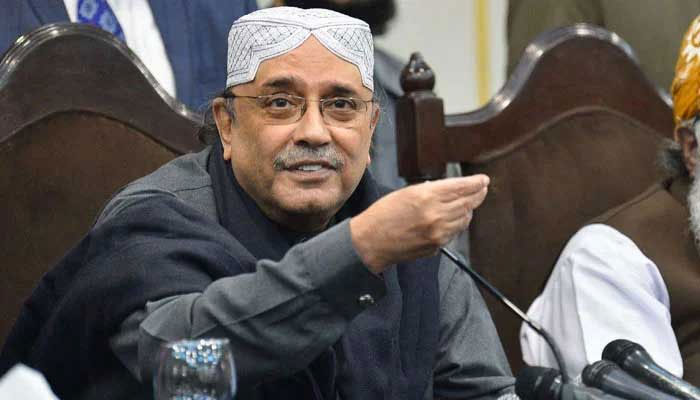A new president
It was Zardari who gave up presidential powers under the 18th Amendment during his first tenure
The new occupant in the President House may have just been elected president but is no stranger to the job. In fact, with Asif Ali Zardari being elected as the 14th president of Pakistan on Saturday after obtaining 411 votes from the electoral college comprising parliament and provincial assemblies, he has made history as the first civilian president to have been elected to this position twice. Zardari was the joint candidate of the ruling coalition and the PPP’s nominee, while the PTI-backed Sunni Ittehad Council (SIC) candidate Mahmood Khan Achakzai bagged 181 votes during the presidential election. The newly-elected president’s oath-taking ceremony will take place today (Sunday) at the Presidency.
Despite the acrimonious political atmosphere, the presidential election seems to have gone off smoothly enough, and Achakzai has congratulated Zardari on his win and said that the election did not see any horse-trading. However, the new president will be taking over at a contentious moment in Pakistan’s political history. Political analysts have for some time been calling former president Arif Alvi’s tenure disappointing. This may be why all eyes may be on incoming president Zardari’s second stint in power. As the face of the federation, what are the potential changes Zardari can offer as the symbol of the federation? For that, it is worthwhile to see his first tenure for some signs. It was Zardari who gave up presidential powers under the 18th Amendment during his first tenure, something constitutionalists across the country still laud him for. One of the bigger expectations from him is that, unlike his predecessor, Zardari will stick to his constitutional duties and will not act as a party member.
But more than anything else, it will be Zardari’s penchant for politics of reconciliation that will be seen as his major strength. This is a superpower that is also shared by Prime Minister Shehbaz Sharif to some extent, the prime minister having proved himself adept at reconciliatory politics during his first stint as PM during the previous PDM government. Now that both the president and PM are politicians known for their reconciliatory approach, some analysts are hoping that this rare combination of experienced and mature politicians will hopefully bring the political temperature down. The bigger challenge will obviously be to bring the PTI on to the negotiating table. The caveat here though is that neither the PML-N nor the PPP have been the ones taking a non-conciliatory approach towards the PTI. Instead, it is the PTI that has refused to talk to any political stakeholder except the establishment.
This government has many challenges on its hands and the foremost is the economy. In an interview before the elections, Asif Zardari had said that one of the most important agendas would have to be a Charter of Economy after the elections. The PPP and its leadership realize that the real challenge to political stability is economic stability and if the economy is up and running, it can lead to overall stability in the country. Another challenge that observers have pointed out is the hybrid system and how much space has been ceded to non-democratic forces by the Imran Khan government since 2018. At the moment, the new setup will have to work within the hybrid system and eventually make space for civilian supremacy. It took the PPP and the PML-N over a decade to realize how important it is to support civilian supremacy, which is why they signed the Charter of Democracy. However, their efforts were undone when ‘Project Imran’ was launched. Now the PDM government and President Zardari will have to maneuver the democratic system in a way that brings in more democracy, not less. For all this and more, a stable presidency that is more concerned about the federation than individual party concerns is an important step forward.
-
 John F. Kennedy Jr. Wife Carolyn Bessette's Last Minute Bridal Crisis Revealed
John F. Kennedy Jr. Wife Carolyn Bessette's Last Minute Bridal Crisis Revealed -
 Mary Cosby Remembers Son Robert Cosby Jr. After His Tragic Death
Mary Cosby Remembers Son Robert Cosby Jr. After His Tragic Death -
 Prince Harry, Meghan Markle Face 'largely Unfair' Criticism After Jordan Trip
Prince Harry, Meghan Markle Face 'largely Unfair' Criticism After Jordan Trip -
 Priscilla Presley Makes Sweet Confession About TV Role: 'I Lied'
Priscilla Presley Makes Sweet Confession About TV Role: 'I Lied' -
 Prince Harry Feels 'hurt' For Archie, Lilibet
Prince Harry Feels 'hurt' For Archie, Lilibet -
 Keith Urban, Nicole Kidman's Daughters Choose One Parent To Side With
Keith Urban, Nicole Kidman's Daughters Choose One Parent To Side With -
 Sarah Ferguson's Hidden Trait Exposed As Expert Dismantles Shadow Side To Her Personality
Sarah Ferguson's Hidden Trait Exposed As Expert Dismantles Shadow Side To Her Personality -
 Sarah Ferguson Backed By Powerful Friends Amid Epstein Fallout
Sarah Ferguson Backed By Powerful Friends Amid Epstein Fallout -
 PINK’s Latest Move Sparks Speculations About Replacing Major Celebrity On Show
PINK’s Latest Move Sparks Speculations About Replacing Major Celebrity On Show -
 Planetary Parade 2026: Here's How To See Six Planets Aligning Today
Planetary Parade 2026: Here's How To See Six Planets Aligning Today -
 Christopher Nolan Reveals Why He's A Fan Of 'Fast & Furious' Movies
Christopher Nolan Reveals Why He's A Fan Of 'Fast & Furious' Movies -
 Ben Affleck Unable To Accept A New Lover Post Jennifer Lopez Divorce As He Still Grieves End Of Bennifer 2.0
Ben Affleck Unable To Accept A New Lover Post Jennifer Lopez Divorce As He Still Grieves End Of Bennifer 2.0 -
 Why Is Demi Moore Being Called Ozempic Victim?
Why Is Demi Moore Being Called Ozempic Victim? -
 Kaley Cuoco Makes Honest Comparison Of 'Big Bang Theory' And 'Charmed' Gigs
Kaley Cuoco Makes Honest Comparison Of 'Big Bang Theory' And 'Charmed' Gigs -
 Robert Picardo Shares Surprising Reaction On Returning To The 'Star Trek' Franchise
Robert Picardo Shares Surprising Reaction On Returning To The 'Star Trek' Franchise -
 AI Feud Deepens As Musk Targets OpenAI Over Safety Concerns
AI Feud Deepens As Musk Targets OpenAI Over Safety Concerns




